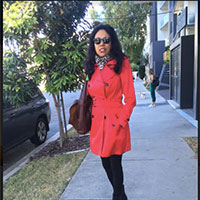Trigger Warning
Redtail leafloves were dancing at a great height from where Salma Hayaat stood at the far end of an alley. It was in the afternoon, while she waited for her camera crew to join her here. The dance was synchronized and choreographed in the wave of the natural symphony. It was a troupe of five, as though, celebrating a festivity. They grouped in two rows—two in the front and three in the back row, also as couples. One leaflove distancing itself slightly, dancing alone. They were rhythmic and spatially distanced—mathematically symmetrical—orchestrated to internal music, which only they could truly hear.
When her crew arrived, they and Salma walked towards a hut down the alley called the Coconut Valley. It was a bamboo hut. A mother lived here with her five children—slum-dwellers. They sat down for a meal on the mud floor with their mother. They ate wet leftover rice with half an onion each. A knock on their hut door caused a distraction. The mother rose to open it. She saw Salma standing here with a group of men. The mother looked befuddled.
Salma introduced herself as a BBC interviewer who wanted to make a documentary on slum living. The mother saw that her crew held huge cameras and big bags on their shoulders. Salma smiled and told her not to worry. That she wanted to come inside her hut and film what they ate; where they slept; what they wore and where they worked.
The children looked at her curiously. She held a saddlebag. They were thinking about what treasure this bag held. Salma noted that and smiled at them. Instead of eating the meager meals before them, they continued to look at her in awe. Salma rummaged through her bag and found some lollies. She handed them over to the children. One of her crew members whispered something to her. Neither the children nor the mother knew that Salma had held her purse in her hand inside the bag almost to offer them some money. After the whisper, she slowly unclasped the purse and let it fall into the bottom of the saddle.
Standing at the door, Salma asked the mother, what her name was. “Ayesha Banu,” she responded.
“How many children do you have, Ayesha?” she asked.
“Five,” Ayesha answered pulling her veil over the top of her head.
“Where do you work?” she asked.
“I am a domestic servant. I do casual work in people’s homes, cleaning toilets and so on.”
“Hmm, may I come in?” Salma asked.
“Yes, you may, but there isn’t enough space in our hut, just enough for one more person, maybe.”
“Where is your husband?” Salma asked.
“He has done a runner – a few years now.”
“Oh! I see. I am sorry,” Salma said.
Salma entered her hut, while her crew filmed through the door. They stood on a dirt road. It was covered in black water, which overflowed from a nearby drain reeking of human excretion. Some of the crew even held a tissue covering their mouths and nostrils. It was humid but breezy. Inside the hut, it was dark. The five children sat on the mud floor. Their eyes were an oval-shaped moon against the night’s sky. Teeth, like glinting diamonds inside a mine wall.
Salma’s crew filmed where they slept. Ayesha told them on the same floor bed, crammed, where they ate now. At a corner, there was a stove and a cluster of pots and pans. Some pans had chipped-off lacquer paint through which the black metal peeked through.
“Do you find it difficult to live alone with the five children that you are raising by yourself?”
“Yes, of course, it is difficult. Allah looks after us.”
“Do they go to school?”
She laughed in mild mockery and said. “No, no school for my children! They go hungry half the time.”
“Still, why not?”
“They go to work. They work in the garbage dump, picking stuff.”
Salma gathered, they pick needles from a haystack—salvageable items from the dump—used plastic bottles, metal chips, hair clips, cases, key-rings, even needles, literally, whatever was sellable in a second-hand market. They finished the meals their mother had put out for them and left. They picked up sacks from a corner, threw them over the shoulders, and off they went, running along the dirt path. Salma followed them all the way to the rubbish heap. It was like a mountain. Salma zoomed in as they conversed.
“Do you think this would sell?” one child asked another.
“His sibling replied. “Are you crazy; who would buy this crap?”
Salma craned her neck to see what it was. It was a glittery object, that shone brightly.
“Do you think, this is gold?”
The child rubbed her thumb over it.
“Silly you, no – of course not. Who would leave a gold piece here in the dump?”
The siblings laughed, like a cacophony of birds. But then Salma thought, she needed to see more. She went forward and the children looked afraid. She held out her palm and they handed it over to her. There it was – a ring – gold or imitation, she didn’t know at that point, but this she knew, if it were gold, then this could fetch good money, for a healthy few days’ meals.
She took it to a pawn shop. They confirmed it was 24 carat. She sold the ring and came back to the hut where the children had already returned. Some rich person made their day. A sheer stroke of luck, this gold made its way here. Salma handed the money over to the mother. Ayesha grinned. She went to the market to get supplies. The lenses followed her to the market and back. Ayesha sat down before the stove and fried eggplant frittatas, rice, and meat. The children played hopscotch outside; the leafloves danced above. The lenses roamed everywhere.
